

Inklings. A corner of the pub, formerly the landlord's sitting-room where the Inklings met.
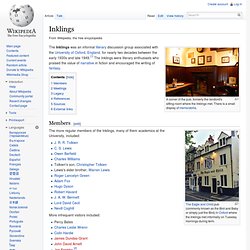
There is a small display of memorabilia. J. R. R. Tolkien. John Ronald Reuel Tolkien (January 3 1892 – September 2 1973) was an English writer, poet, philologist, and university professor, most famous for his classic high fantasy works.
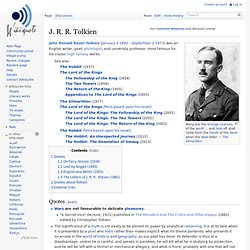
See also: Mythopoeia by J.R.R. Tolkien. Middle-earth. Tolkien prepared several maps of Middle-earth and of the regions of Middle-earth where his stories took place.
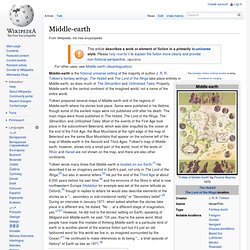
Some were published in his lifetime, though some of the earliest maps were not published until after his death. C. S. Lewis. Now at last they were beginning Chapter One of the Great Story which no one on earth has read: which goes on for ever: in which every chapter is better than the one before.
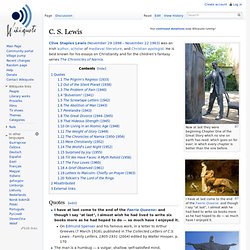
I have at last come to the end of the Faerie Queene: and though I say "at last", I almost wish he had lived to write six books more as he had hoped to do — so much have I enjoyed it. Clive Staples Lewis (November 29 1898 – November 22 1963) was an Irish author, scholar of medieval literature, and Christian apologist. He is best known for his essays on Christianity and for the children's fantasy series The Chronicles of Narnia.
Quotes[edit] Only the skilled can judge the skilfulness, but that is not the same as judging the value of the result. I believe in Christianity as I believe that the sun has risen. When I became a man I put away childish things, including the fear of childishness and the desire to be very grown up. The Chronicles of Narnia. The Chronicles of Narnia is a series of seven high fantasy novels by author C.S.
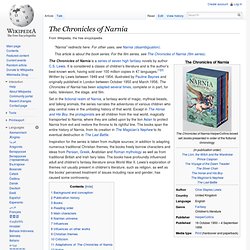
Lewis. It is considered a classic of children's literature and is the author's best-known work, having sold over 100 million copies in 47 languages.[1][2] Written by Lewis between 1949 and 1954, illustrated by Pauline Baynes and originally published in London between October 1950 and March 1956, The Chronicles of Narnia has been adapted several times, complete or in part, for radio, television, the stage, and film. Inspiration for the series is taken from multiple sources; in addition to adapting numerous traditional Christian themes, the books freely borrow characters and ideas from Persian, Greek, Anatolian and Roman mythology as well as from traditional British and Irish fairy tales. The books have profoundly influenced adult and children's fantasy literature since World War II. Background and conception[edit] The Lion all began with a picture of a Faun carrying an umbrella and parcels in a snowy wood.
Charles Williams (British writer) Charles Walter Stansby Williams (20 September 1886 – 15 May 1945) was a British poet, novelist, theologian, literary critic, and member of the Inklings.
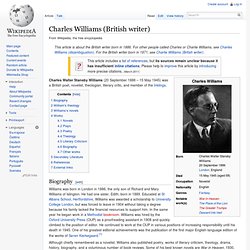
Williams gathered many followers and disciples during his lifetime. He was, for a period, a member of the Salvator Mundi Temple of the Fellowship of the Rosy Cross. He met fellow Anglican Evelyn Underhill (who was affiliated with a similar group, the Order of the Golden Dawn) in 1937 and was later to write the introduction to her published Letters in 1943.[3] Williams also formed master-disciple relationships with young women throughout his lifetime. The best known (though probably not the most significant) of these occurred in the early 1940s with Lois Lang Sims. Lang Sims, whom Williams referred to as Lalage, published a series of letters that Williams wrote to her during this period in a volume entitled Letters to Lalage (1989).
Williams developed the concept of Co-inherence, described as a theology of romantic love. The Place of the Lion. Platonic archetypes begin to appear throughout England, wreaking havoc and drawing to the surface the spiritual strengths and flaws of individual characters.
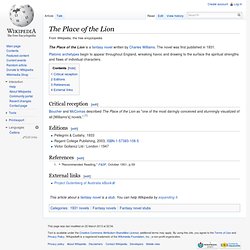
Critical reception[edit] Boucher and McComas described The Place of the Lion as "one of the most daringly conceived and stunningly visualized of all [Williams's] novels. ".[1] Editions[edit] Pellegrini & Cudahy, 1933Regent College Publishing, 2003, ISBN 1-57383-108-5Victor Gollancz Ltd / London / 1947 References[edit] External links[edit] George MacDonald. George MacDonald (December 10, 1824 – September 18, 1905) was a Scottish author and Christian universalist minister most famous for his poetry, fairy tales and fantasy novels.
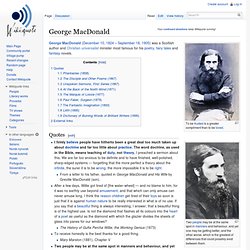
Quotes[edit] Two people may be at the same spot in manners and behaviour, and yet one may be getting better, and the other worse, which is the greatest of differences that could possibly exist between them. Never be discouraged because good things get on so slowly here; and never fail daily to do that good which lies next to your hand. Trust to God to weave your little thread into the great web, though the pattern shows it not yet. I firmly believe people have hitherto been a great deal too much taken up about doctrine and far too little about practice. Phantastes (1858)[edit] Why are all reflections lovelier than what we call the reality? All love will, one day, meet with its return.
Alas!